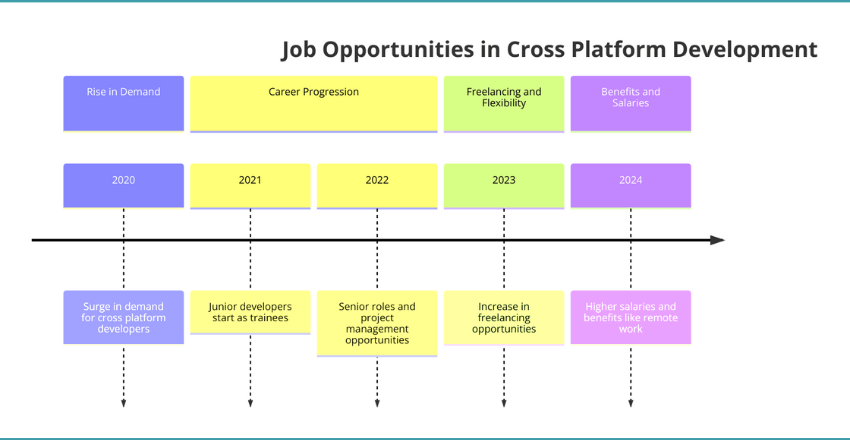
Cross Platform Developers wield the power to unify software experiences, bridging gaps between iOS, Android, and desktop applications seamlessly.
The mobile app development industry is rapidly growing, and the demand for cross platform developers is increasing. Cross-platform development refers to creating an app that can work seamlessly on different platforms, such as iOS and Android.
Cross platform developers play a significant role in bridging the gap between different platforms, ensuring that apps are optimized for various devices. With the rise of technological advancements, there is a greater need for developers who can create efficient, cost-effective, and user-friendly mobile applications.
The Role of Cross Platform Developers
Cross platform developers play a crucial role in the mobile app development industry by bridging the gap between different mobile platforms such as iOS and Android. These developers possess the skills and expertise to create applications that function seamlessly on different platforms, resulting in an app that can be used by a wider audience.
Developers use technologies such as React Native, Xamarin, and Flutter to build cross platform applications that can run on multiple platforms, including iOS and Android. By using these technologies, developers can write code once and deploy it across different platforms, thus saving time and resources.
The Benefits of Cross Platform Development
Cross platform development offers a number of benefits, including:
- Cost-effectiveness: With cross platform development, businesses can save money by only having to develop one codebase instead of multiple ones for each platform.
- Faster time-to-market: Cross platform development enables businesses to launch their application on multiple platforms simultaneously, resulting in a faster time-to-market.
- Greater reach: By developing an application that can run on multiple platforms, businesses can reach a wider audience.
Cross platform developers must possess knowledge of various programming languages, including JavaScript, C#, and Swift, and be able to adapt to different platforms and technologies as they evolve. With their skill set and expertise, cross platform developers play a critical role in ensuring that businesses can meet the demand for mobile applications on various platforms.
Technological Advancements and Cross Platform Development
The demand for cross platform developers has been on the rise in recent years, largely due to technological advancements that have made it easier to develop apps that can run on multiple platforms. Previously, developers had to create separate versions of their apps for different platforms, which was time-consuming and expensive. However, modern tools and frameworks such as Xamarin, React Native, and Flutter have made cross platform development more efficient and cost-effective.
One of the most significant technological advancements in cross platform development has been the development of cloud-based technologies. Cloud-based tools such as Microsoft’s Azure and Amazon’s AWS provide developers with the ability to run their apps on a wide range of platforms without having to worry about compatibility issues. This has made cross platform development more accessible to a larger number of developers than ever before.
Another technological advancement that has contributed to the popularity of cross platform development is the rise of hybrid mobile app development. Hybrid mobile apps are essentially web apps that are embedded within a native app shell, allowing them to run on multiple platforms. This approach has become increasingly popular due to its ability to combine the strengths of both web and native apps.
Overall, technological advancements have played a crucial role in the rise of cross platform development. As technology continues to evolve, it is likely that we will see even more innovations that will further streamline the development process and make it even easier for developers to create apps that can run on multiple platforms.
Benefits of Cross Platform Development

Cross platform development has become increasingly popular in recent years, and for good reason. As mobile app development continues to expand, more and more companies are turning to cross platform developers to ensure their apps are accessible across multiple platforms. In this section, we’ll explore some of the key benefits of cross platform development.
Cost-effectiveness
One of the biggest advantages of cross platform development is its cost-effectiveness. With cross platform development, developers can write code once and deploy it across multiple platforms, saving both time and money. Rather than having to create separate codebases for each platform, cross platform developers can create a single codebase that works across all platforms, reducing the development costs for the company.
Faster time-to-market
In addition to cost savings, cross platform development also allows for faster time-to-market. With a single codebase, developers can deploy the app across multiple platforms simultaneously, reducing the time it takes to release the app to the market. This is especially important in today’s fast-paced tech industry, where companies need to stay ahead of the competition by getting their products to market as quickly as possible.
Consistency across platforms
Cross platform development also ensures consistency across platforms. With a single codebase, developers can ensure that the app looks and operates the same on each platform. This can help to create a more seamless user experience, which in turn can lead to increased user satisfaction and engagement.
Easy maintenance
Finally, cross platform development makes maintenance easier. With a single codebase, developers can make updates and changes to the app across all platforms simultaneously. This reduces the need for separate maintenance and updates for each platform, which can save time and reduce costs in the long run.
Overall, the benefits of cross platform development make it a smart choice for companies looking to develop mobile apps across multiple platforms. By leveraging the expertise of cross platform developers, companies can save money, reduce development time, create a more consistent user experience, and simplify maintenance and updates.

High Demand for Cross Platform Developers
The mobile app development industry is witnessing a surge in demand for cross platform developers. The need for efficient app development across multiple platforms is becoming increasingly important as more and more businesses are operating in a global market. With the increasing number of smartphone users and devices, businesses now need to ensure their app or software is compatible with iOS, Android, and other platforms. This is where cross platform developers come in.
The demand for cross platform developers has risen rapidly in recent years due to the ever-evolving technology in the market. They not only bridge the gap between different mobile platforms but also bring a unique set of skills and expertise in developing software that can be used across multiple platforms. It is no surprise that businesses are actively seeking cross platform developers to help them create robust and flexible apps that can cater to a wider audience.
The demand for cross platform developers is expected to continue to rise in the coming years. As businesses seek to expand their reach in a global market, the need for cross platform developers will become even more important. This is why many developers are now opting to specialize in cross platform development, as this can provide them with job security and a more diversified skill set.
The high demand for cross platform developers is also creating job opportunities across the industry. Many companies are now looking to hire cross platform developers to help them stay ahead of the curve and develop cutting-edge apps that can compete in a crowded market.
Cross platform developers are in high demand due to their ability to bridge the gap between different mobile platforms and their unique set of skills in developing software that can be used across multiple platforms. As technological advancements continue to evolve, the demand for cross platform developers is expected to rise in the coming years, creating new job opportunities across the industry.
Job Opportunities in Cross Platform Development

Cross platform development has seen a surge in demand in recent years, leading to a significant rise in job opportunities for cross platform developers. The ability to develop applications that can run seamlessly on multiple platforms makes cross platform development a valuable skillset for many companies.
As the demand for cross platform developers continues to grow, so do the job opportunities available in this field. Many companies are now actively seeking cross platform developers to join their teams, making it a lucrative career choice for those with the necessary skills.
Cross platform developers typically work on projects that involve developing applications for multiple platforms such as iOS, Android, and web applications. They are responsible for ensuring that these applications work smoothly on all devices and platforms. This requires a deep understanding of each platform’s unique features and limitations, as well as expertise in programming languages such as React Native, Flutter, or Xamarin.
Cross platform development offers a wide range of job opportunities for developers of all levels of experience. Junior developers can start their careers as trainees or assistants, while experienced developers can take up roles such as senior developers, project managers, or team leaders. Freelancing is also an option, giving cross platform developers greater flexibility in terms of working hours and project choices.
Many companies now offer cross platform development job opportunities that come with numerous benefits such as flexible working hours, remote working, and health benefits. In addition, the demand for cross platform developers is often accompanied by higher salaries than those of single platform developers.
Overall, the demand for cross platform developers is set to continue growing in the coming years, making it a highly attractive career choice for developers with a passion for mobile app development.
So, if you are interested in pursuing a career in cross platform development, now is the time to start building your skills and searching for job opportunities in this exciting field.
Hiring Cross Platform Developers from Brazil

Cross platform development is becoming increasingly important as more businesses seek to develop mobile applications for multiple platforms. With this demand comes a pressing need for cross platform developers. One option US and UK firms have for finding these developers is to look to Brazil.
Brazil has emerged as a major player in the tech industry, with a growing pool of skilled cross platform developers. One factor contributing to this trend is the lower cost of living in Brazil compared to the US and UK. This means that companies can often hire talented developers at a lower cost without sacrificing quality. Additionally, Brazilian cross platform developers often possess proficiency in English, making communication and collaboration easier.
Hiring cross platform developers from Brazil can also provide the advantage of a different perspective. Developers from different countries and cultures can bring fresh ideas and approaches to problem-solving. This can ultimately lead to more innovative and effective solutions.
However, it is important to carefully evaluate potential candidates and ensure they possess the necessary skills and expertise. This can be done through careful screening and evaluating their past work experience. It may also be helpful to work with a reputable staffing agency or consultancy specializing in cross platform development.
The Benefits of Hiring Cross Platform Developers from Brazil
| Advantages | Explanation |
|---|---|
| Lower Cost | Hiring developers from Brazil can often be more cost-effective than hiring from the US or UK. |
| Proficiency in English | Many Brazilian developers possess strong English skills, making communication and collaboration easier. |
| Unique Perspective | Developers from different countries and cultures can bring fresh ideas and approaches to problem-solving. |
Overall, hiring cross platform developers from Brazil can be a valuable option for US and UK firms seeking skilled developers at a lower cost and with a unique perspective.
Outsourcing Cross Platform Development Teams
Outsourcing cross platform development teams can provide numerous benefits for US and UK firms. By outsourcing to countries like Brazil, firms can tap into a large pool of skilled cross platform developers who are proficient in English, yet come at a lower cost than hiring locally. Additionally, outsourcing allows firms to acquire an entire team of cross platform developers, rather than just one or two individuals. This can result in increased efficiency and faster time-to-market.
When outsourcing, it is important to carefully vet potential partners and ensure that they have a strong track record of delivering high-quality work on time and within budget. Communication is also key, and firms must ensure that there are clear lines of communication established to facilitate collaboration and prevent misunderstandings.
Overall, outsourcing cross platform development teams can be a strategic decision for firms seeking to expand their capabilities and take advantage of the increasing demand for cross platform development.
Challenges in Cross Platform Development

Cross platform development may offer numerous benefits, but it also comes with its unique set of challenges. One of the most significant challenges for cross platform developers is platform-specific limitations that can hamper the deployment of features across all platforms.
Compatibility issues between different operating systems can also be a roadblock for cross-platform development. As mobile app development adopts new technologies, it becomes increasingly challenging to ensure that the app works seamlessly across all platforms.
Another challenge is the difficulty in maintaining consistent user experience across different devices and platforms. Cross-platform developers must ensure that the app looks and behaves the same way on iOS and Android devices while maintaining optimal performance.
Moreover, cross-platform development requires developers to have a solid understanding of the different programming languages and development frameworks used in creating apps for different platforms. This can be a time-consuming and challenging task, especially for developers who are new to the field.
Overcoming Challenges in Cross Platform Development
Despite the challenges, cross platform developers can overcome these obstacles through strategic planning and innovative approaches.
- Developers can use cross-platform development tools and frameworks to streamline the development process and simplify the cross-platform deployment of applications.
- They can also leverage cloud-based platforms and APIs to enable seamless integration across different platforms.
- Translating codebases between different platforms can help reduce the impact of platform-specific limitations and compatibility issues.
With the right strategies in place, cross platform developers can overcome the obstacles to create compelling and consistent user experiences across multiple platforms.
Wrapping up
Cross-platform developers hold a crucial role in the mobile app development industry and are in high demand due to the increasing need for efficient app development across multiple platforms. Aspiring developers need to remain updated with technological advancements and emerging trends to meet industry demands and deliver effective solutions.
External Resources
https://dotnet.microsoft.com/en-us/apps/xamarin
FAQ

Cross-platform development has become increasingly popular as it allows developers to write code once and deploy it across multiple platforms, such as Windows, macOS, Android, and iOS. Here are three frequently asked questions by cross-platform developers, complete with answers and code samples:
1. How can I manage state across multiple platforms in a Flutter application?
Answer:
In Flutter, managing state across multiple platforms can be achieved using the Provider package. It allows you to efficiently pass data and change notifications to widgets in your app.
Code Sample:
import 'package:flutter/material.dart';
import 'package:provider/provider.dart';
// Define a simple model class with ChangeNotifier
class CounterModel with ChangeNotifier {
int _count = 0;
int get count => _count;
void increment() {
_count++;
notifyListeners();
}
}
void main() {
runApp(
ChangeNotifierProvider(
create: (context) => CounterModel(),
child: MyApp(),
),
);
}
class MyApp extends StatelessWidget {
@override
Widget build(BuildContext context) {
return MaterialApp(
home: Scaffold(
appBar: AppBar(title: Text('Counter App')),
body: Center(
child: Consumer<CounterModel>(
builder: (context, counter, child) => Text('${counter.count}'),
),
),
floatingActionButton: FloatingActionButton(
onPressed: () => Provider.of<CounterModel>(context, listen: false).increment(),
child: Icon(Icons.add),
),
),
);
}
}Explanation:
This code sample uses the Provider package to manage state in a Flutter application. The CounterModel class holds the application state and extends ChangeNotifier to notify listeners of changes. The ChangeNotifierProvider at the root of the app provides an instance of CounterModel to the widget tree. The Consumer<CounterModel> widget rebuilds its child widget when the CounterModel notifies that it has changed, allowing for efficient state management across all platforms that Flutter supports.
2. How can I share code between a React Native app for iOS and Android?
Answer:
React Native enables you to write your app’s logic using JavaScript, which can be shared across both iOS and Android platforms. Platform-specific code can be managed using the Platform module.
Code Sample:
import { Platform, StyleSheet, Text, View } from 'react-native';
const App = () => {
return (
<View style={styles.container}>
<Text style={styles.welcome}>
Welcome to React Native!
</Text>
{Platform.OS === 'ios' ? (
<Text style={styles.instructions}>Running on iOS</Text>
) : (
<Text style={styles.instructions}>Running on Android</Text>
)}
</View>
);
};
const styles = StyleSheet.create({
container: {
flex: 1,
justifyContent: 'center',
alignItems: 'center',
backgroundColor: '#F5FCFF',
},
welcome: {
fontSize: 20,
textAlign: 'center',
margin: 10,
},
instructions: {
textAlign: 'center',
color: '#333333',
marginBottom: 5,
},
});
export default App;Explanation:
This React Native code sample demonstrates how to write a simple app that adjusts its behavior based on the platform. The Platform module is used to check the operating system and conditionally render platform-specific text. This approach allows you to maintain a single codebase for both iOS and Android platforms, with the ability to implement platform-specific features or styles when necessary.
3. How can I create a responsive UI in Xamarin.Forms that works on both mobile and tablet devices?
Answer:
Xamarin.Forms supports building UIs that adapt to different screen sizes and orientations by using the OnIdiom XAML markup extension, which allows you to specify different layouts for phones and tablets.
Code Sample:
<ContentPage xmlns="http://xamarin.com/schemas/2014/forms"
xmlns:x="http://schemas.microsoft.com/winfx/2009/xaml"
xmlns:local="clr-namespace:YourAppNamespace"
x:Class="YourAppNamespace.YourPage">
<StackLayout>
<Label Text="Welcome to Xamarin.Forms!"
VerticalOptions="CenterAndExpand"
HorizontalOptions="CenterAndExpand"
FontSize="{OnIdiom Phone=20, Tablet=40}" />
</StackLayout>
</ContentPage>Explanation:
This Xamarin.Forms code sample uses the OnIdiom markup extension within a XAML file to specify different font sizes for phones and tablets. This approach allows the UI to adapt to different device types, ensuring that the user interface looks good on both small and large screens. By using OnIdiom, developers can fine-tune the UI for various devices within the same codebase, making it easier to manage cross-platform UI consistency.

William is a highly accomplished technical author specializing in cross-platform app development. With a rich background in the tech industry, he has worked at prestigious companies like Uber and Facebook, where he honed his skills as an iOS developer since 2009. Throughout his career, William has been an advocate for leveraging frameworks like React Native and Xamarin to create innovative and efficient cross-platform mobile apps.
Having pursued a degree in Computer Science and Mathematics at Caltech, William is equipped with a strong educational foundation. Currently residing in LA with his two daughters, he finds solace in exploring the scenic hills through hiking. Passionate about knowledge sharing, William not only builds cutting-edge applications but also takes pleasure in teaching students how to develop their own cross-platform mobile apps. His expertise, combined with his dedication to empowering others, makes him an invaluable asset in the field of app development.






